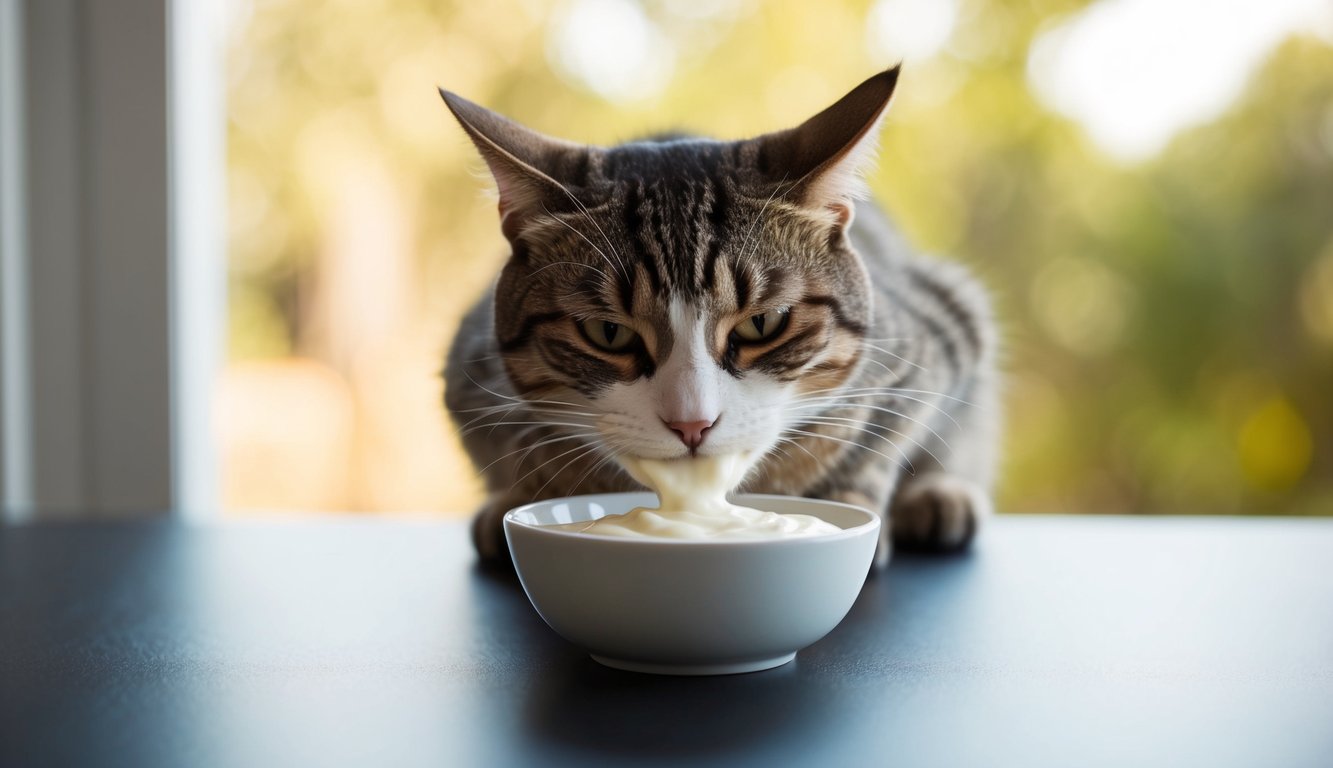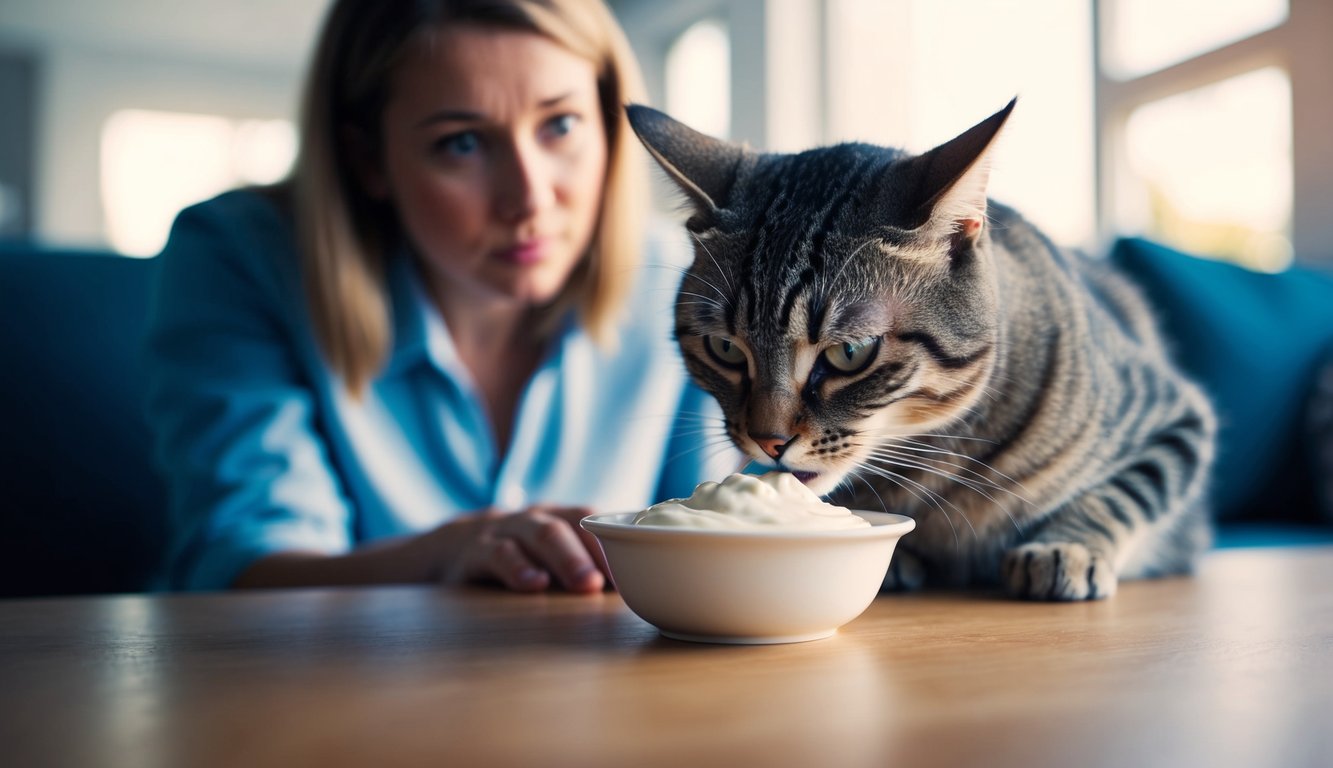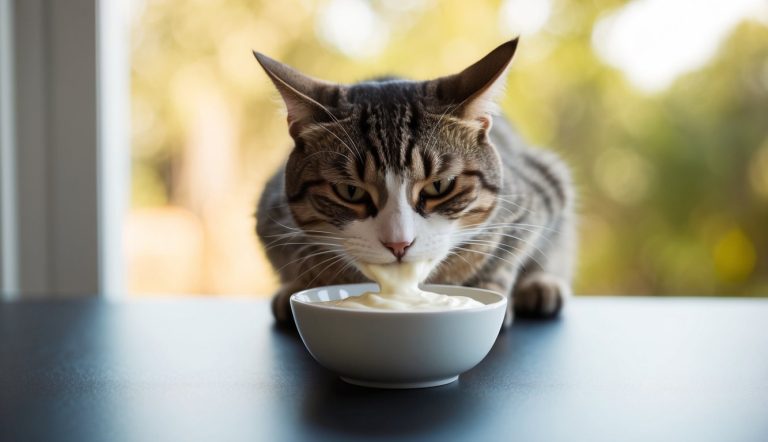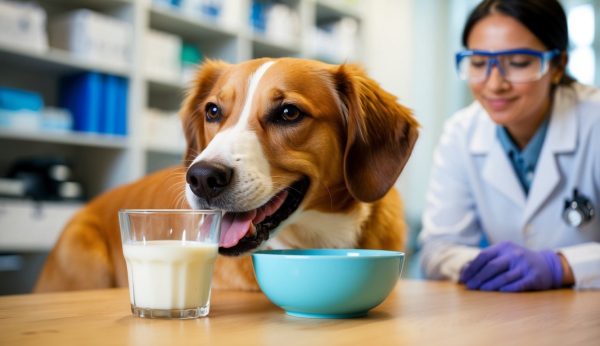Can Cats Eat Yogurt?
Most cats can have a small taste of plain yogurt, but it is not always safe. It depends on your cat’s age, health, and their ability to digest dairy.
Understanding Cats’ Dietary Needs
- Cats are obligate carnivores, which means they need animal protein to stay healthy. Their bodies are not built to handle large amounts of dairy or sugars. Unlike humans, cats create only a small amount of lactase, the enzyme needed to digest lactose in milk.
- Many cats become lactose intolerant as they grow older. This means that most adult cats have trouble digesting milk, cheese, or yogurt. Even a small spoonful of yogurt could cause your cat stomach pain, gas, or diarrhea if they cannot process lactose.
- While yogurt has less lactose than milk, it still has enough to create problems for some cats. Plain and unsweetened yogurt is safer because added sugars, flavors, and artificial ingredients can make your cat sick. If your cat is feral or has not eaten dairy before, they are more likely to be sensitive to yogurt. It’s best not to make yogurt a regular part of your cat’s diet.
Why Cats Might Be Interested in Yogurt
- Your cat might try to taste yogurt because of its smell and texture. Cats are curious and often lick foods that their humans eat. The smooth, creamy feel of yogurt can also attract your cat’s tongue and saliva, as many cats lick things with a soft texture.
- Some cats are drawn to the fat and protein in plain yogurt. If you leave yogurt unattended, your cat might take a bite or lick, just as feral cats will try to eat high-protein foods when they find them. However, cats do not eat yogurt in the wild and do not need it in their diet.
- If your cat takes a bite, watch for any signs they are not feeling well such as vomiting or diarrhea. Cat bites or licks to shared food do not make the yogurt safer or more digestible for the cat. If you notice any bad reactions, it’s best to avoid giving yogurt in the future.
Potential Health Benefits of Yogurt for Cats

Some cats may have health benefits from eating small amounts of plain, unsweetened yogurt. These benefits relate mostly to their digestion and the effect of probiotics on their overall health.
Yogurt and Digestive Health
- Plain yogurt can be easier for some cats to digest than milk. This is because yogurt has lower amounts of lactose, which is the sugar that many cats cannot break down. The live cultures in yogurt help break down much of the lactose, reducing the chance of stomach upset.
- Eating yogurt in small amounts may support your cat’s digestion. Cats that are sensitive to lactose may still get mild stomach problems, like gas or diarrhea, if they eat too much. It is important to only offer a spoonful or less and always choose yogurt that is free from added sugars and artificial sweeteners.
- Yogurt also contains a good amount of water. This can help add a little extra hydration to your cat’s diet, especially if your cat does not drink much on its own.
Probiotics and the Feline Microbiome
- Probiotics are healthy bacteria found in some yogurts. These bacteria may help keep your cat’s gut microbiome balanced. A healthy microbiome can support better digestion, stronger immune function, and less risk of some digestive problems.
- Some studies suggest that having more “good” bacteria in the gut may also help your cat feel better and learn new things more easily, since gut health is linked to brain function. While research in pets is still new, adding probiotics through yogurt may be a safe way to promote your cat’s wellness if given in moderation.
- Remember, only plain, unsweetened yogurt with live, active cultures offers these possible benefits. Avoid flavored or sweetened varieties because they can include ingredients that are harmful to cats, such as xylitol.
Risks of Feeding Yogurt to Cats

Giving your cat yogurt might seem harmless, but there are real health concerns you need to consider. Yogurt can upset your cat’s stomach and may cause other issues based on its ingredients.
Lactose Intolerance in Adult Cats
Most adult cats have trouble digesting milk products because their bodies do not make enough lactase, the enzyme needed to break down lactose. When a cat eats lactose-containing foods like regular yogurt, this can lead to digestive problems.
Common symptoms of lactose intolerance in cats include:
- Diarrhea or loose stools
- Gas and bloating
- Abdominal pain
Even though plain yogurt has less lactose than milk, it still contains some. You may notice your cat acting uncomfortable or avoiding food after eating yogurt. Veterinarians usually do not recommend dairy in a cat’s diet for this reason. If your cat has ever had tummy troubles after dairy, it’s best to skip yogurt as a treat.
Possible Allergic Reactions
Some cats are sensitive or allergic to dairy proteins such as casein or whey. Allergic reactions to yogurt can happen even if it is plain or unsweetened. Signs of a food allergy in cats can include:
- Itchy skin or scratching
- Swelling around the face or mouth
- Vomiting after eating dairy products
In rare cases, cats might develop more severe reactions, like trouble breathing. If you ever notice these symptoms, stop offering yogurt and talk to your vet. Remember that food allergies are different from lactose intolerance, and can affect cats even in small amounts. Keep an eye out for any unusual signs if your cat tries yogurt for the first time.
Added Sugars and Artificial Ingredients
Many types of yogurt, especially those made for people, contain added sugars, sweeteners, flavorings, or artificial colors. These are not safe or healthy for cats. Sugar can lead to weight gain, while some artificial sweeteners like xylitol are highly toxic to animals.
If you give yogurt to your cat, always avoid flavored varieties. Even small amounts of artificial ingredients can harm your pet. Some yogurts use fruit mixes or chocolate, both of which can be dangerous for cats. Antibiotics might also interact with additives in yogurt, so always check the label before offering any to your cat. For a safer choice, stick to small tastes of plain, unsweetened yogurt, and only with your vet’s approval. For more information, find out what types of yogurt are safe for cats.
Yogurt Feeding Guidelines for Cats
Cats can eat small amounts of plain yogurt if they do not show signs of illness afterward. It is important to know how much is safe and which types of yogurt are best for your cat.
How Much Yogurt Is Safe?
- Most adult cats are lactose intolerant, so their stomachs may not handle regular dairy well. A tiny taste, like a spoon tip or a lick from your finger, is usually enough. Too much yogurt can cause stomach upset, such as diarrhea or vomiting.
- Limit treats like yogurt to no more than once or twice per week. Yogurt should always be a special treat, not a daily food. Cats need most of their hydration from fresh water and wet cat food, not dairy snacks. If your cat is trying yogurt for the first time, watch carefully for any allergic reactions or digestive issues.
Choosing the Right Type of Yogurt
Always choose plain yogurt without added sugars, artificial sweeteners, or fruit flavors. Flavored yogurts often have extra sugar, which is not good for cats. Some types even have artificial sweeteners like xylitol, which is dangerous for pets. Look for yogurt with live, active cultures. These can be easier to digest and may help sensitive stomachs. Avoid yogurts with high-fat content or extra ingredients like chocolate or nuts.
A simple way to remember this:
- Give only plain yogurt
- Avoid sugar, sweeteners, and flavorings
- Read the ingredient label carefully
Plain yogurt in small amounts is less likely to upset your cat’s stomach and safer as an occasional treat.




